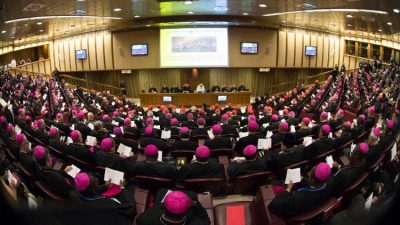
By Cian Molloy - 12 January, 2019

The final document of the Synod of Bishops on Young People, Faith and Vocational Discernment was published in English this week.
The work is “the fruit of discernment” that followed two years of listening to young people and those who work in youth ministry from across the globe.
The French, Italian, Portuguese and Spanish versions of the final document were published in October last year, but now the English-language version is also available.
The 27,000 word document is wide ranging and covers issues such as the voice of youth in society, cultural identity, gender politics, democracy, education, child protection, social media, migration, the family, bodily integrity and sexuality, the idea of conscience and the practice of discernment.
On the issue of clerical abuse, the synod document said: “The various forms of abuse perpetrated by certain bishops, priests, religious and laypersons give rise in the victims, many of whom are young, to sufferings that can last a lifetime and that no repentance can remedy.”
Claiming that the phenomenon is widespread in society, the synod made a firm commitment to adopt “rigorous preventative measures intended to avoid any recurrence, starting with the selection and formation of those to whom tasks of responsibility and education will be entrusted”.
The synod also expressed thanks to “those who have the courage to denounce the evil they have suffered: they help the Church to acknowledge what has happened and the need to respond decisively”.
The bishops said that the presence of young people at a synod, which occur once every three years in the Vatican, was a “new departure” and that as a result “the voice of a whole generation was heard loud and clear at the Synod”.
However, the Synod noted that not all young people have the same experiences: “Of particular significance is the difference in demographic dynamics between countries with a high birth rate, where young people represent a significant and growing proportion of the population, and those in which the influence of the young is on the wane.
“A further differentiating factor is the result of history: there are countries and continents of ancient Christian tradition, whose culture is marked by a memory that is not to be lightly dismissed, but there are also countries and continents marked by other religious traditions, in which Christianity is a minority presence – often a recent one.
“In other territories again, the Christian communities and the young people who belong to them suffer persecution.”
Looking at differences between countries, and within countries, the bishops said there was a need for the Church “to align herself courageously” on the side of those who find themselves excluded and discarded.
The section on the Church’s involvement in education is particularly relevant to Ireland, where there is currently much debate on the issue. The Synod fathers wrote: “There are many regions where young people see the Church as a force that is alive and engaging, of significance also for their contemporaries who do not believe or who belong to other religions. The Church’s educational institutions seek to welcome all young people, irrespective of their religious choices, their cultural origins and their personal, family or social situation. In this way the Church makes a fundamental contribution to the integral education of the young in many different parts of the world…
“When inspired by intercultural and interreligious dialogue, the Church’s educational activity is appreciated even by non-Christians as an authentic form of human promotion.”
On the issue of women’s involvement in the Church and its decision making, the bishops wrote: “The absence of the feminine voice and perspective impoverishes debate and the Church’s journey, depriving discernment of a precious contribution. The Synod recommends that everyone be made more aware of the urgency of an inevitable change.”
The bishops also acknowledged that there is “a substantial number of young people, for all sorts of reasons, do not ask the Church for anything because they do not see it as significant for their lives. Some, on the contrary, expressly ask to be left alone, as they find the presence of the Church a nuisance, even an irritant”.
But they also wrote: “Among the expectations of the young, one that stands out particularly is the desire for the Church to adopt a less paternalistic and more candid style of dialogue.”